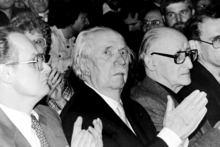Fritz Eberhard
Fritz Eberhard | |
|---|---|
 Eberhard at the award ceremony of the Carl von Ossietzky Medal, 1979 | |
| Born | Adolf Arthur Egon Hellmuth Freiherr von Rauschenplat October 2, 1896 Dresden |
| Died | March 30, 1982 (aged 85) Berlin |
| Occupation | Journalist |
| Education | Political science |
| Alma mater | University of Tübingen |
| Notable works | How to Conquer Hitler: A Plan of Economic and Moral Warfare on the Nazi Home Front |
Fritz Eberhard (2 October 1896 – 30 March 1982) was a German journalist, anti-fascist and social democrat and fought in the German Resistance against Nazism. He was a member of the Internationaler Sozialistischer Kampfbund (ISK). After the war, Eberhard was a member of the Parliamentary Council, precursor of the Bundestag, where he was one of the founders of the modern German constitution.[1]
Early years[edit]
Eberhard was born Helmut (or Hellmut) von Rauschenplat, a noble family in Dresden that dated back to the Middle Ages.[2] In 1914, he began studying political science and economics, attending universities in Frankfurt am Main, Heidelberg und Tübingen. Taking three years off, from 1915 to 1918, to serve in World War I,[3] he received his doctorate in 1920.[4] During this time, he developed his social and political ideas and became an adherent of the ideas of Robert Wilbrandt and Leonard Nelson.[5] In 1921, he joined the Internationaler Jugendbund, the forerunner of the ISK. He also joined the SPD in 1922 and the Jungsozialisten, but withdrew from the SPD in 1924. He also taught economics at the ISK school, Walkemühle in Melsungen.[4] He worked as an editor for the ISK newspaper, Der Funke, where from 1932–1933, he was responsible for covering economic politics.[4]
Resistance and exile[edit]
After the Nazi Party seized power in 1933, Rauschenplat was forced to go underground because of an arrest warrant and took the name "Fritz Eberhard".[4] He began heading up the banned ISK in Germany in 1934 and worked on building an independent socialist trade union, the Unabhängigen Sozialistischen Gewerkschaft.[4] He also worked closely with Hans Jahn and the railroad Resistance group organized by the International Transport Workers' Federation and he maintained contact with the Willi Eichler and the exiled ISK leadership in London. During this period, he also wrote articles under a pseudonym for the Stuttgarter Sonntagszeitung until it was banned in 1937. The underground organization of the ISK was crushed by the Gestapo in 1937. Eberhard was able to flee to London,[4] but fell into conflict with Eichler over his advocacy of direct action against Nazi Germany. As a result, he left the ISK in 1939, along with Hilde Meisel and Hans Lehnert. Following his split, he worked closely with Waldemar von Knoeringen and Richard Löwenthal and with the Sender der europäischen Revolution. He also worked as a journalist for several newspapers.
Return to Germany[edit]
In April 1945, Eberhard was able to return to Germany, with the help of the Office of Strategic Services. He became a commentator and advisor to the American program director at Radio Stuttgart.[4] In October, he re-joined the SPD and in 1946, he was elected to the Württemberg-Baden Landtag.[4] In 1948-1949, he was a member of the Parlamentarischer Rat,[4] the Parliamentary Council that was involved in writing the postwar constitution. Eberhard played a leading role in ensuring the right to conscientious objector status be included in the new laws of the Federal Republic of Germany. From 1949 to 1958, he worked at Süddeutscher Rundfunk as political director.[4] From 1961 to 1968, he was the director and an honorary professor at the Institut für Publizistik at the Freie Universität Berlin.[4] In 1979, Eberhard and Axel Eggebrecht were awarded the Carl von Ossietzky Medal.
Eberhard died in Berlin in 1982. His personal papers are at the archives of the Institute of Contemporary History in Munich.[4]
Works by Eberhard[edit]
Between 1934 and 1939, Eberhard published 71 articles in Sozialistische Warte with the pen name, Fritz Kempf or the abbreviation, F.K. In 1939, he wrote How to Conquer Hitler with Hilda Monte.[4]
References[edit]
- ^ "Nachruf von Manfred Rexin" Archived 6 March 2012 at the Wayback Machine SPD Berlin, official website. (1 April 1982) Retrieved 16 July 2010 (in German)
- ^ Bernd Sösemann: Fritz Eberhard. Rückblicke auf Biographie und Werk. Beiträge zur Kommunikationsgeschichte Vol. 9, p. 73. Steiner, Stuttgart (2001) ISBN 3-515-07881-9 (in German)
- ^ Ansgar Diller, "Fritz Eberhard - Politiker und Publizist: Ein Repräsentant der Remigration im Nachkriegsdeutschland" Arbeitskreis selbstständiger Kultur-Institute, e.V., official website. Retrieved 19 July 2010 (in German)
- ^ a b c d e f g h i j k l m Fritz and Elizabeth Eberhard Collection Archived 20 July 2011 at the Wayback Machine (PDF) Institute of Contemporary History, official website. Munich. Retrieved 21 July 2010 (in German)
- ^ Fritz Eberhard, Arbeit gegen das Dritte Reich (PDF) German Resistance Memorial Center, official website. Lecture at the Evangelische Akademie Berlin (24 June 1974) Retrieved 19 July 2010 (in German)
External links[edit]
- Fritz Eberhard in the German National Library catalogue
- Deutsche Exilzeitschriften 1933-1945 (in German)
- Fritz-Eberhardt-Gesellschaft e.V. (in German)
- Institute for Contemporary History Official website
- German journalists
- German male journalists
- 20th-century German journalists
- People of the Office of Strategic Services
- German resistance members
- Exiles from Nazi Germany
- 1982 deaths
- Commanders Crosses of the Order of Merit of the Federal Republic of Germany
- 1896 births
- German male writers
- ARD (broadcaster) people
- Members of Parlamentarischer Rat
- Burials at the Waldfriedhof Zehlendorf
